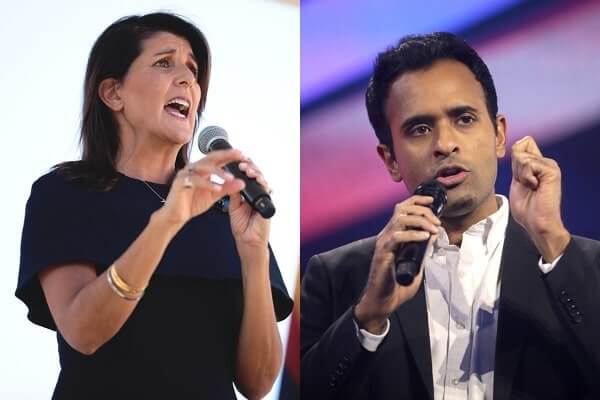Indian-American Vivek Ramaswamy may have decided to withdraw from the election race in support of Donald Trump, but along with Nikki Haley, he has transformed himself into a symbol of prominence for Indian-Americans in American politics.
In announcing his withdrawal from the race, Ramaswamy stated, “As I have said since the beginning, there are two America-first candidates in this race. And earlier tonight, I called Donald Trump to tell him that I congratulate him on his victory, and now going forward, he will have my full endorsement for the presidency. I think we will do the right thing for this country.”
I respect immensely President Trump’s openness to putting the right ideas into action. May the next 4 years be an American renaissance ahead of us.
https://t.co/RMQ57fDUx2
— Vivek Ramaswamy (@VivekGRamaswamy) January 18, 2024
However, Trump’s campaign team has now made it clear that Vivek Ramaswamy’s name would not be considered for the vice-presidential candidacy. A top aide, Jason Miller, conveyed this message a day after Trump criticised Ramaswamy on social media, cautioning voters that “a vote for Vivek is a vote for the other side.”
The comments by Miller came amid intense criticism and attacks in the U.S. presidential election, with both Ramaswamy and Nikki Haley claiming the Republican Party’s candidacy. Both candidates engaged in verbal sparring, which is not uncommon in American politics. The key difference between Haley and Ramaswamy lies in their political experience, with Haley having a longer history in politics compared to Ramaswamy, who is a 38-year-old entrepreneur entering the political arena for the first time.
Despite the internal tensions within the Indian-American community over various issues and political ideologies, the success so far of Indian-American candidates in this election reflects a significant shift. The visibility of candidates like Ramaswamy, with his Hindu identity, is considered historic in American politics. During a debate in Iowa, when asked about his religion, Ramaswamy openly stated, “I am Hindu. I will not hide my identity.”
Ramaswamy has sought to integrate his Hindu faith with conservative values, much like Donald Trump, criticising so-called ‘woke politics’ and aligning with traditional Christian values on issues such as same-sex marriage. The political landscape has seen the Indian-American community’s opinions divided on these matters, leading to internal tensions.
Ramaswamy’s openness about his identity is a departure from the past, where many Indian-Americans preferred to align themselves with American values. Candidates like Nikki Haley, who claims Christian identity (even changing her name from Nimrata Nikki Randhawa), and Kamala Harris, who emphasises her Indian roots, have also played significant roles in shaping the narrative around Indian-Americans in U.S. politics.
While the majority of Indian-Americans are generally associated with the Democratic Party, the presence of prominent leaders like Bobby Jindal, Nikki Haley, and Vivek Ramaswamy within the Republican Party challenges this perception. The controversy and rivalry between Ramaswamy and Haley serve as a reflection of the diversity and divisions within the Indian-American community.
I have a different style and approach from Joe Biden and Donald Trump. No drama. No vendettas. No whining. Just results. pic.twitter.com/llqGBFhi4c
— Nikki Haley (@NikkiHaley) January 16, 2024
However, the path to broader recognition and acceptance of Indian-Americans faces notable challenges. A recent AAPI Data/AP-NORC Survey, released on November 14, 2023, revealed that over a quarter of Indian Americans lacked sufficient knowledge about either candidate, pointing to a critical issue of name recognition. This underlines the importance of navigating the complexities of identity and political visibility within the community.
“At the same time, there are limitations to the political influence of Indian Americans in US politics,” Karthick Ramakrishnan American political scientist, currently a professor of public policy at the University of California, Riverside wrote in a recent article in the Times of India. “First is name recognition. Even though Nikki Haley and Vivek Ramaswamy have generated plenty of news headlines in the US and India, AAPI Data/AP-NORC Survey released on November 14, 2023 revealed that over one quarter of Indian Americans did not know enough about either candidate to offer an opinion. Furthermore, partisanship looms large in American politics, and Indian-Americans tend to be strong supporters of the Democratic Party. So, even though Indian-Americans give higher marks for Haley and Ramaswamy than for Trump, more still view these candidates unfavourably than favourably.”
The remarkable political achievements of Indian-Americans are particularly noteworthy considering their relatively small size, accounting for less than 2% of the U.S. population. Moreover, the fact that 72% of the Indian-American electorate is foreign-born, with nearly a quarter having arrived in the last two decades, adds a layer of complexity to their political engagement. The challenge lies in bridging the gap between the experiences of recent immigrants and the broader concerns of the Indian-American community.





